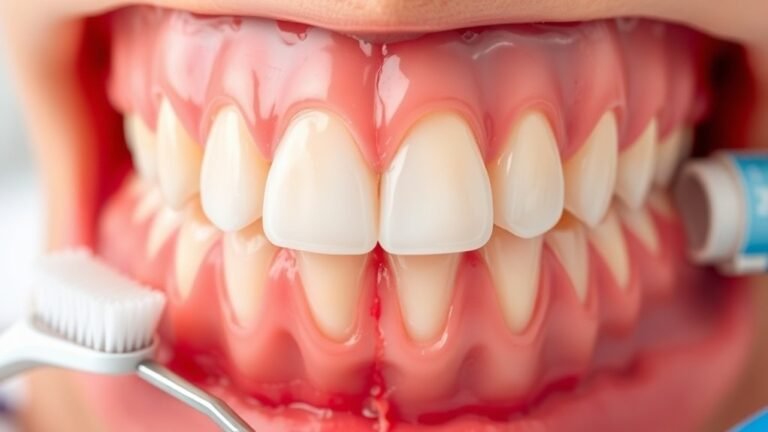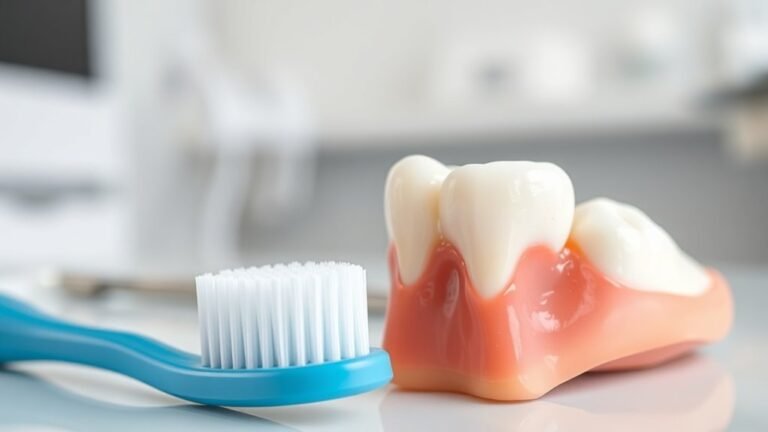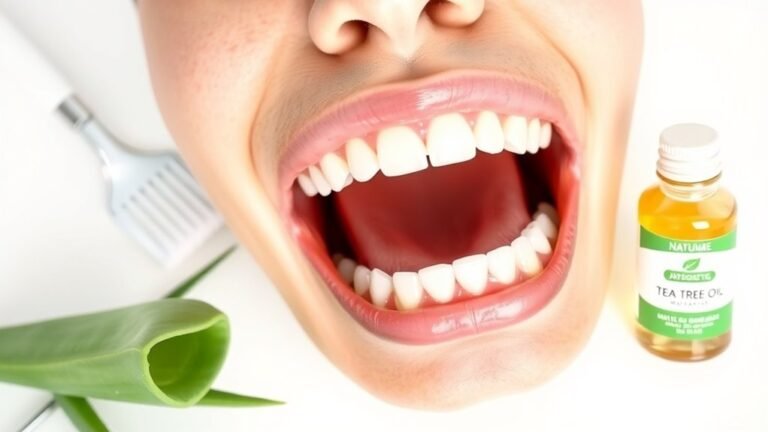How Does Poor Oral Hygiene Increase the Risk of Gum Swelling and Bleeding
Poor oral hygiene can lead to gum swelling and bleeding because it allows harmful bacteria to thrive in your mouth. When you neglect brushing and flossing, plaque builds up, causing inflammation in the gums. This results in symptoms like redness, swelling, and bleeding, indicating potential gum disease. Over time, untreated issues can worsen your gum health and overall well-being. Discover the essential steps you can take to prevent these problems and maintain healthy gums.
Key Takeaways
- Poor oral hygiene leads to plaque buildup, promoting harmful bacteria growth that irritates gums and causes swelling.
- Neglecting to brush and floss allows gingivitis to develop, resulting in inflammation and bleeding gums.
- Inadequate removal of food particles and plaque increases gum sensitivity and pain during oral care activities.
- Ignoring signs of gum disease can lead to more severe periodontal issues, exacerbating swelling and bleeding.
- Consistent oral care maintains a healthy balance of bacteria, preventing gum irritation and promoting overall gum health.
The Role of Bacteria in Gum Health
While you might think of bacteria as solely harmful, they actually play a complex role in gum health. Certain bacteria are essential for maintaining a balanced oral environment. When your oral health is compromised, harmful bacteria can proliferate, leading to inflammation, gum swelling, and gum bleeding. This imbalance can trigger gum disease, a serious condition that requires prompt attention. Good oral hygiene practices, including brushing and flossing, help control harmful bacteria while promoting beneficial ones. By doing so, you reduce the risk of inflammation and maintain healthier gums. Understanding this balance is vital; it’s not just about eliminating bacteria but fostering a symbiotic relationship that supports gum health. Prioritizing your oral hygiene can greatly impact your overall gum health and well-being.
Consequences of Neglecting Brushing and Flossing
Neglecting brushing and flossing can lead to serious consequences for your oral health. Without proper oral hygiene, plaque builds up, leading to gingivitis, which is the initial stage of gum disease. This condition causes gum irritation, resulting in symptoms like redness and swelling. You may also experience bleeding gums during brushing or flossing, a sign that your gums are inflamed and unhealthy. If left untreated, gingivitis can progress to more severe periodontal disease, which can cause irreversible damage to your gums and supporting structures of your teeth. Ultimately, neglecting your daily oral care routine not only affects your gums but can also impact your overall health, making it essential to prioritize brushing and flossing consistently.
Signs and Symptoms of Gum Disease
Gum disease often presents a range of signs and symptoms that can signal a need for immediate attention. Recognizing these warning signs early can help you maintain your dental hygiene and prevent further complications.
- Gum Pain: You might experience sharp or dull pain in your gums, indicating potential infection.
- Gum Sensitivity: Increased sensitivity when brushing or flossing could signal inflammation in the gum tissue.
- Gum Infection: Swelling, redness, or bleeding when you floss or brush can suggest a serious gum infection requiring prompt treatment.
If you notice any of these symptoms, it’s essential to seek professional help to control inflammation and protect your gum health. Ignoring these signs can lead to more severe issues down the line.
Preventive Measures for Healthy Gums
Taking steps to maintain your gum health is vital in preventing issues like gum disease. Start by brushing your teeth twice daily and flossing regularly to remove plaque before it hardens into tartar. This daily routine supports gum healing and keeps your oral microbiome balanced. Incorporating natural supplements, such as vitamin C and coenzyme Q10, can further enhance gum health. A balanced diet rich in fruits, vegetables, and whole grains provides essential nutrients that support your gums and overall oral health. Additionally, stay hydrated to promote saliva production, which helps wash away food particles and bacteria. By consistently following these preventive measures, you’ll considerably reduce your risk of gum swelling and bleeding, ensuring your gums remain healthy and strong.
The Connection Between Oral Hygiene and Overall Health
While many people may not realize it, maintaining good oral hygiene is essential not just for a bright smile but also for overall health. Poor dental care can lead to issues such as gingiva inflammation, tooth decay, and even systemic health problems. Here are three connections between oral hygiene and overall health:
Maintaining good oral hygiene is vital for both your smile and overall health, preventing serious dental and systemic issues.
- Immune Support: A healthy mouth promotes a strong immune system, reducing the risk of infections.
- Oral Probiotics: Incorporating probiotics can balance oral bacteria, enhancing gum health and preventing decay.
- Herbal Supplements: Some herbal supplements can support oral health, reducing inflammation and promoting healing.
Frequently Asked Questions
Can Poor Oral Hygiene Affect My Breath?
Yes, poor oral hygiene can definitely affect your breath. When plaque and bacteria build up, they produce foul-smelling compounds, leading to bad breath. Regular brushing and flossing can help keep your breath fresh and pleasant.
How Often Should I Visit the Dentist?
Visiting the dentist regularly is like tending a garden; you need consistent care for healthy results. Aim for check-ups every six months to catch issues early and maintain ideal oral health, preventing future problems.
What Foods Contribute to Gum Disease?
Sugary snacks, acidic foods, and processed carbohydrates can contribute to gum disease. They promote plaque buildup and inflammation, so it’s essential to limit these items and focus on a balanced diet for healthier gums.
Can Stress Impact My Gum Health?
Yes, stress can impact your gum health. It weakens your immune system, making it harder to fight off infections. This increases your risk of gum disease, leading to swelling and bleeding if not managed properly.
Is Mouthwash Effective in Preventing Gum Issues?
Yes, mouthwash can be effective in preventing gum issues. It helps reduce plaque, fight bacteria, and freshen breath. However, it shouldn’t replace brushing and flossing; combine all three for best oral health.
Conclusion
To summarize, maintaining good oral hygiene is essential to prevent gum swelling and bleeding. Neglecting your brushing and flossing can lead to a bacterial invasion that wreaks havoc on your gums, causing pain and discomfort. Remember, a healthy mouth is the gateway to overall well-being; without it, you might as well be inviting a tornado into your life. By adopting preventive measures and staying vigilant, you can guarantee your gums remain healthy and vibrant for years to come.






